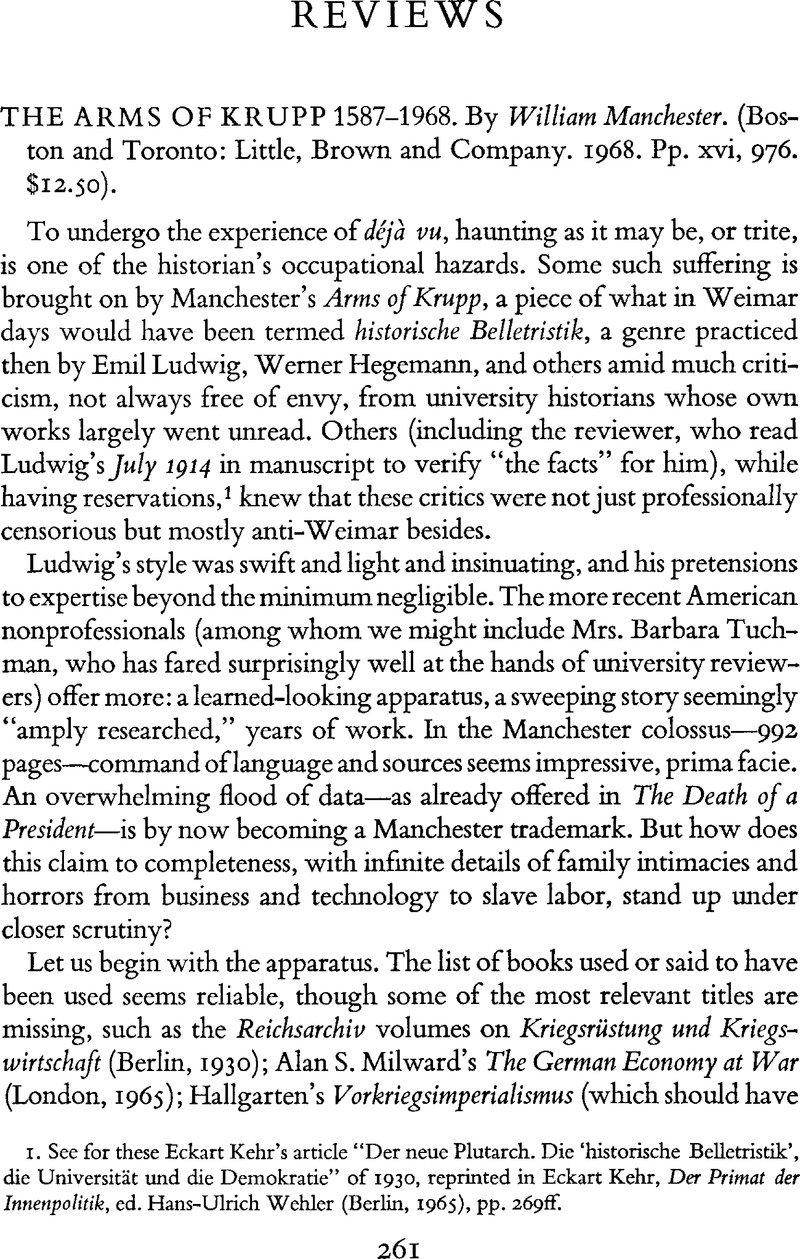No CrossRef data available.
Published online by Cambridge University Press: 16 December 2008

1. See for these Kehr's, Eckart article “Der neue Plutarch. Die ‘historische Belletristik’, die Universität und die Demokratie” of 1930, reprinted in Eckart Kehr, Der Primat der Innenpolitik, ed. Wehler, Hans-Ulrich (Berlin, 1965), pp. 269ff.CrossRefGoogle Scholar
2. As to this Leieutenant General Keim's memoris, Erlebtes und Erstrebtes (Hanover, 1925), might have been used to advantage.Google Scholar
3. For this see Eschenburg, Theodor, Die improvisierte Demokratie der Weimarer Republik (Scholss Laupheim, n.d. [ca. 1952]), p. 39, based on Groener's own explanations.Google Scholar
4. As an example: Holstein writing in September 1908 about a person “discouraged in his attempts to bring a naval limitations action under way. Oh yes, the armor plate uncles are strong paymasters. They have the things for that. Consequently, we are losing our skins.“ von Trotha, Friedrich, Fritz von Holstein (Berlin, 1931), p. 61.Google Scholar
5. There had been an earlier title, “The House of Krupp,” that was preempted by another book. The old preference comes out in the repeated descriptions of the family residence, the Villa Hügel, with its atmosphere and decor, in its massiveness enough to start anesthetic youth movement. The reviewer can attest to the accuarcy of Manchester' descriptions, having visited the villa in December 1918 when as a member of a field soldier's council passing through Essen he decided to view a complex which he was inclined to regard as one of the fontes et origines malorum in the fallen Second Reich.
6. For a highly sympathetic picture of Gustav Krupp von Bohlen see Glum, Friedrich, Zwischen Wissenschaft, Wirtschaft und Politik (Bonn, 1964), pp. 262ff. Glum was in a position somewhat similiar to that of the director of the Ford Foundation. His story also denies Manchester's blunt statement that “Gustav had never given a pfenning to anyone except the Führer” (p. 780).Google Scholar
7. To illustrate changed tastes among Americans of various generations: an American traveller in the 1880's, Henry van Dyke (“America for Me”), “liked the German fir woods, in green battalions drilled,” if only to return to the homeland ”to ramble for a day/ In the friendly woodland where Nature had her way.” Jean Anne Vincent, comp., Patriotic Poems America Loves (New York, 1968), p. 39Google Scholar. But then Americans had not yet learned to hate and fear Germany, including her forests. Today the Black Forest is a well-manicured resort area rather less farouche than, say, the Dordogne or the northern parts of Spain.
8. For the Russian version of Sippenhaftung as formulated and applied to the Krupps by Stalin at Postdam see Truman, Harry S, Memoirs, I (Garden City, N.Y., 1955), 407.Google Scholar
9. Since this review was written, there have been two events worth noting for a better history of Krupp and aditional criticism of Manchester: First, the present President of the Bundesrepublik has authorized the publication of the very illuminating memoirs of his father, whi, unmentioned by Manchester, served Krupp for thirty-one years in fairly high positions—Heinemann, Otto, Kronenorden Vieter Klasse. Das Leben des Prokuristen Heinemann. 1864–1944 (Düsseldorf, 1969). Second, the Bavarian Motorworks have field in a Connecticut court a $250,000 lawsuit against Manchester for having “brought the company into contempt and ridicule and greatly damaged its reputation and business credit” by statements made on p.844.Google Scholar